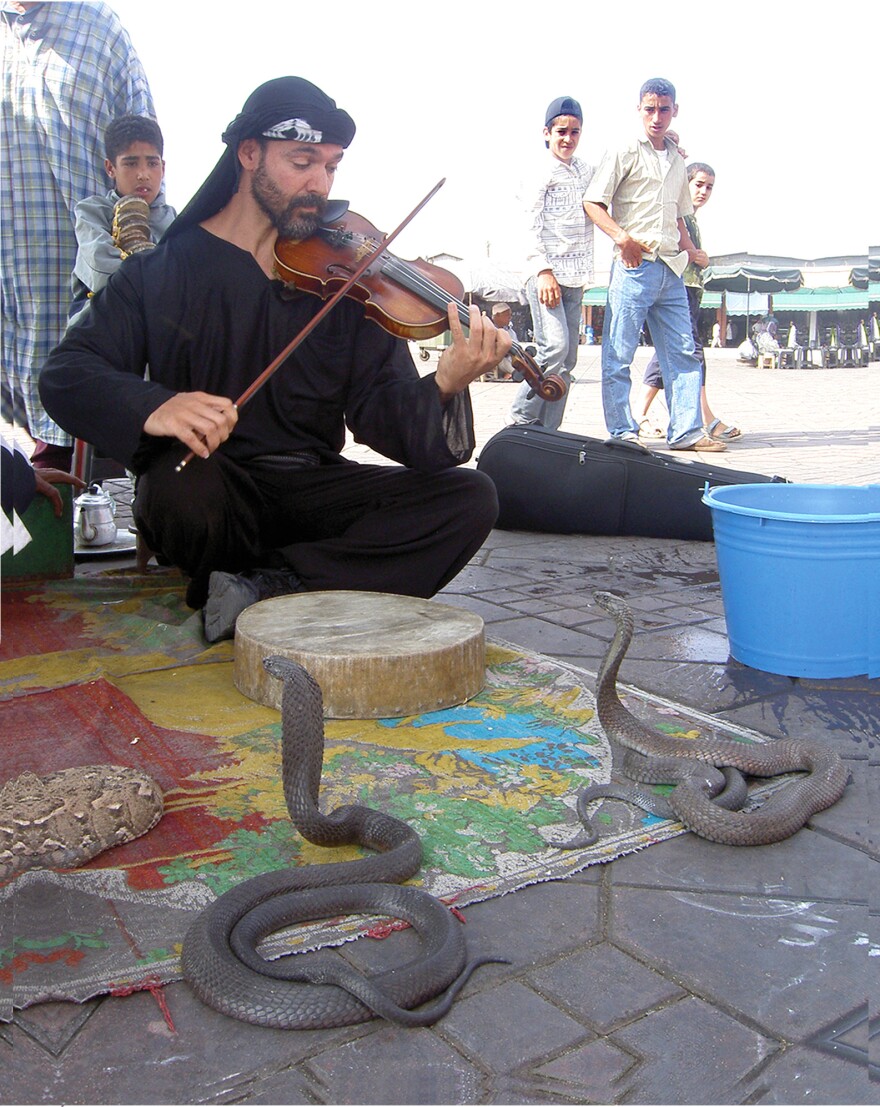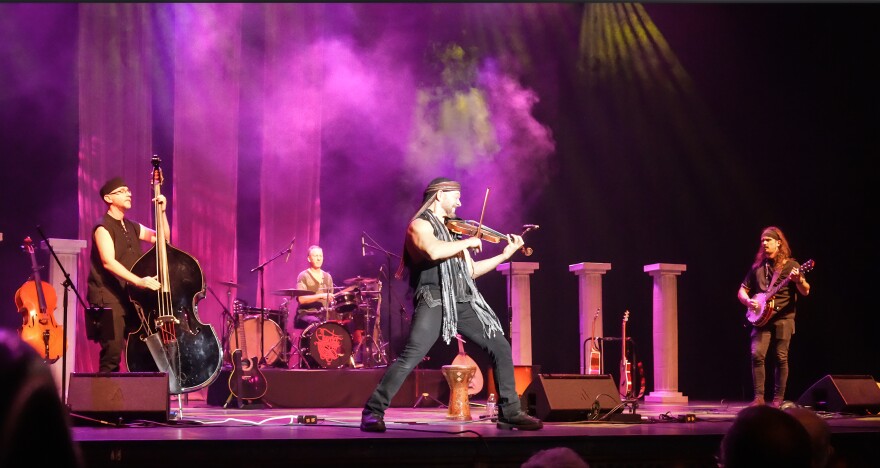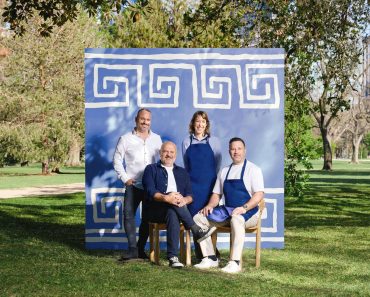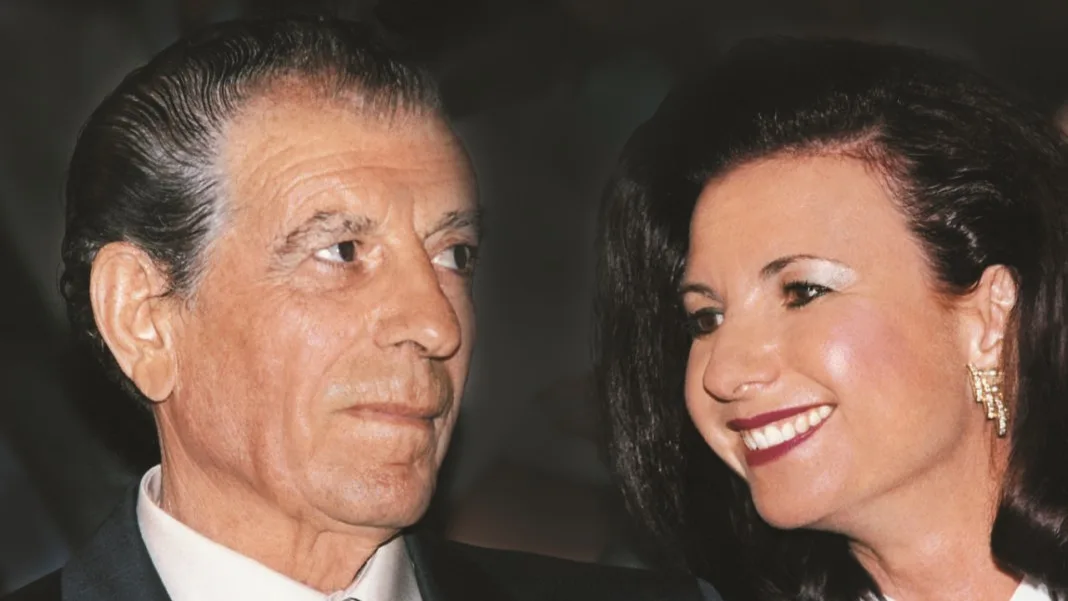Scott Jeffers is the front man for the band Traveler. He’s been performing his eclectic style of music around the Valley for years. He describes Traveler’s sound as a multicultural experience, blending Middle Eastern, Celtic, Greek and Turkish instruments and scales with American folk and rock.
Traveler performs Saturday night at Pier 54 in Tempe, and The Show spoke to him here in the studio about his musical origins — which, no surprise, came from being a literal traveler.

Full conversation
SCOTT JEFFERS: You get into Marrakesh and you’re walking into the big square and there’s all these groups, kind of like street performers. And you’re hearing the traditional Berber music of that area, which is very old and it’s very Led Zeppelin-esque. The riffs, it’s very riff-oriented, but on the banjos and you’re hearing those pentatonic notes, you know, with some of the passing notes that we also use in the blues, and you’re like, wow.
If it wasn’t for the timing that it’s in, it would be straight up rock and roll.
SAM DINGMAN: Yeah.
JEFFERS: So yeah, that’s. You really can trace it back, you know.
DINGMAN: So tell me about yourself as a musician prior to that experience in, in Marrakesh, were you somebody who was always drawn towards sounds from other places or was this something of an awakening for you?
JEFFERS: Yeah, kind of both. You know, I had been exposed to a lot of ethnic music with my mom being Lebanese and my dad playing a lot of his folk music from, you know, more American folk music.
So I’m growing up as a child like that, and as I began playing instruments, I found myself being better at the exotic scales the than I was at, you know, or just more interested, I should say, in those exotic, you know, frameworks to play within.
DINGMAN: And was that because it specifically reminded you of the Lebanese music your mom would share?
JEFFERS: I guess subconsciously that could have been it. But all I know is at that time I was like, wow, I love this. You know, specifically there was a band called Rainbow and they had a song called “Gates of Babylon.”
[MUSIC CLIP PLAYS]
And there’s something about it that just had a magical effect on me. So I just dove into those types of songs very deeply.
DINGMAN: So this is interesting to me. If I’m hearing you right, you were already playing music at a young age.
JEFFERS: Yeah, 12. I was playing on an instrument.
DINGMAN: What instrument?
JEFFERS: I started on guitar.
DINGMAN: So if I’m hearing you right, it’s like you’re going along, you’re 12-year-old kid learning guitar like a lot of kids do, and then you have this awakening to the potential of incorporating scales from outside the general American style. And it sounds like it starts to feel like a bit of an awakening, like a calling to pursue more sounds like that.
JEFFERS: Absolutely. I think that would be very accurate.
DINGMAN: So when did you start traveling abroad and having experiences like the Marrakesh one you were describing?
JEFFERS: Yeah, I guess it’s been about 20 years. I started traveling. I was just so attracted to Greek music in, the very old Greek music that I just, I had to find out where this, like, you know, I needed to know it firsthand. Just the recording wasn’t enough or reading it in a book wasn’t enough. I needed to taste the food, I needed to smell the streets. I needed to see the culture around me, to know like, what is the real essence of this music? Why does it feel this way?
And so I went to Greece and spent a month just traveling through Greece and then ended up in Turkey on that trip as well. But then every year I go usually up to three months a year I’m traveling.
DINGMAN: So when did Greek music enter the picture for you?
JEFFERS: There was a Cat Stevens song that used a bouzouki and …
DINGMAN: And a bouzouki’s like a stringed instrument.
JEFFERS: Yeah. It’s a double chords, chorused stringed instrument that looks kind of like a mandolin, like a teardrop body, but a very long neck.
DINGMAN: OK.
JEFFERS: But it has a very specific style.
[MUSIC CLIP PLAYS]
JEFFERS: Later I was working with a upright bass player from the Tucson Symphony Orchestra and he had a Haris Alexiou CD. And she was kind of, she’s what made me fall in love with Greek music. Like her voice is an instrument on its on itself.
[MUSIC CLIP PLAYS]
And the fact that I had no idea what she was singing about because it’s in Greek, made it even more mystical to me. I would always paint my own meanings and they were always, you know, I’m just picturing her singing about something so deep, you know, and so poetic.
DINGMAN: Yeah.
JEFFERS: Because the, the language is so beautiful.
DINGMAN: So it was, it was a feeling that sounds like that called you to Greece.
JEFFERS: Oh yeah. When you hear it, it’s. It’s like you said, it’s awakening. It’s, it’s not, it’s something that just clicks inside of you and you’re like, whoa. That’s what I’ve been missing my whole life.
DINGMAN: Time to buy a plane ticket.
JEFFERS: Yeah, that’s, that’s basically what happened.
DINGMAN: Yeah.
JEFFERS: So the music base ended up luring me all over the planet pretty much.
DINGMAN: What do you think it is about being a stranger in a strange land that feeds the writing process?
JEFFERS: You’re very vulnerable. You’re, you don’t have any of your, you know, your comforts of your protection of your house. “Oh, I got a house to go to. I have a, you know, my car is over here, and, oh, my friends live right there.”
Like, there’s nothing. You’re lost. You know, you’re walking around with a violin and a backpack, you know, one shoe untied, maybe. I don’t know. So you’re just lost, and it makes you very vulnerable, which puts you in a very good state as a composer …
DINGMAN: Because you’re open.
JEFFERS: You’re very open. Yeah.
DINGMAN: Since you’ve mentioned the violin, I have a sense from listening to Traveler’s music that. I know you play a number of different instruments, but it seems like violin is fairly constant.
JEFFERS: Spot on. Yeah, it’s, you know, a lot of instruments are very specific to an area, but violin, you find in almost every culture. It’s fretless, so you can maneuver into whatever intonation it needs to be. You know, with a bow, you can continually sing a note. Fade it out gently. Fade it in gently.
And the great thing for a Traveler is that you can take it with you anywhere.
DINGMAN: So Traveler started in, like, around the year 2000, right. So this is almost 25 years you’ve been doing this. And the way that we talk about music and culture and whether or not cultures can be owned, all of that has evolved a lot in the course of those more than two decades. And sometimes people who play music that doesn’t originate from the culture that they were born into get accused of, like appropriation.
Is that something that you’ve ever been concerned about, or is that a criticism you’ve ever had to deal with?
JEFFERS: For me, I think it’s all a celebration of culture. I get it. If you use it in a way that’s only benefiting you financially and making somebody else look in a derogatory way to somebody else. But I’m not sure there’s such thing as stealing a style. You can certainly steal somebody’s composition.
DINGMAN: Oh, of course. Yeah.
JEFFERS: But I don’t think you can steal a style. Like I was saying with the, you know, that Berber music from Morocco, it sounds like the blues, only it’s in a funky timing that nobody here would count, be able to dance to.
So you put it in 4/4, right. And all of a sudden you have Led Zeppelin, Cream, you know, Jimi Hendrix. You have that.
DINGMAN: I mean, I hear this in Traveler’s music, that it feels like there’s a collision of influences from all over the world. And the final product of that is some other thing.
[MUSIC CLIP PLAYS]
JEFFERS: Once you fuse it, it now is something new.
DINGMAN: It’s something else.
[MUSIC CLIP PLAYS]
DINGMAN: So, Scott, you’ve got your violin out now.
JEFFERS: I do.
DINGMAN: Let’s start by having you play us something on the violin. That, for you, sounds particularly good when you play it on the violin.
JEFFERS: Wow. There’s so much on the violin that works so well. Bluegrassy-type stuff sounds really good on the fiddle. You know.
[MUSIC CLIP PLAYS]
DINGMAN: I have to say I wouldn’t have made this connection previously as a bluegrass listener, but because of the conversation we just had, I felt like I heard a bit of a blues scale.
JEFFERS: That’s what makes bluegrass bluegrass, I think, is that it came from Scotland and Ireland, their folk music, and then mixed with the blues.
DINGMAN: So let’s go to the bouzouki next.
JEFFERS: Yeah. Greek bouzouki.
[MUSIC CLIP PLAYS]
And the Greeks do stuff like that. Like, they’ll pull off a note which gives it a little inflection, you know?
DINGMAN: Right.
JEFFERS: It’ll trill a lot.
DINGMAN: So you also have your oud.
JEFFERS: Yes, this is a Turkish oud. I have quite a few ouds. This is, this one’s for Ms. Tamboul.
[MUSIC CLIP PLAYS]
In my 20 years of travel, I’ve been to Greece four or five times, been to Scotland four times, Ireland, Turkey, probably six times. I just keep going back because there’s so much to learn. You can’t possibly learn all there is to learn.
Like, these are really, really deeply rooted styles that they would say you have to be born into it to master it. A lot of people, musicians, spend their life preserving a style of music that’s great, but not me, I want to make a mess of and then create something beautiful out of that mess.
You know, mix it up and find the things that are new. I would like people to say, I don’t know what. What that is. I’ve never heard anything like that. That, to me, is a good.
DINGMAN: Scott Jeffers is the front man for Traveler, who will be performing Saturday night at Pier 54 in Tempe.

KJZZ’s The Show transcripts are created on deadline. This text is edited for length and clarity, and may not be in its final form. The authoritative record of KJZZ’s programming is the audio record.
-
Courtney Brown is a professor at Southern Methodist University, where she directs a choir that performs music using one of her most innovative instruments: dinosaur skulls.
-
Peter Sagal and Bill Kurtis, hosts of Wait Wait… Don’t Tell Me!, are taking their weekly comedy show on the road to Arizona Financial Theatre on Dec. 4.
-
“How To Get Free” was inspired by artist Christopher Rivas’ experience in relationships; his life as a person of color in America; and the Greek myths of Sisyphus, Tantalus and Narcissus. The project will debut at ASU Gammage this Saturday, Nov. 15.
-
Kenaim Al-Shatti is a visual artist whose work is far from what you might see hanging on the wall on a gallery wall. In fact, it’s often not even the kind of work that is meant to be the center of attention: concert visuals.
-
Neko Case, a former Tucsonan and Grammy nominee, is beloved for her eclectic songwriting style, which fans sometimes refer to as “country noir.”







